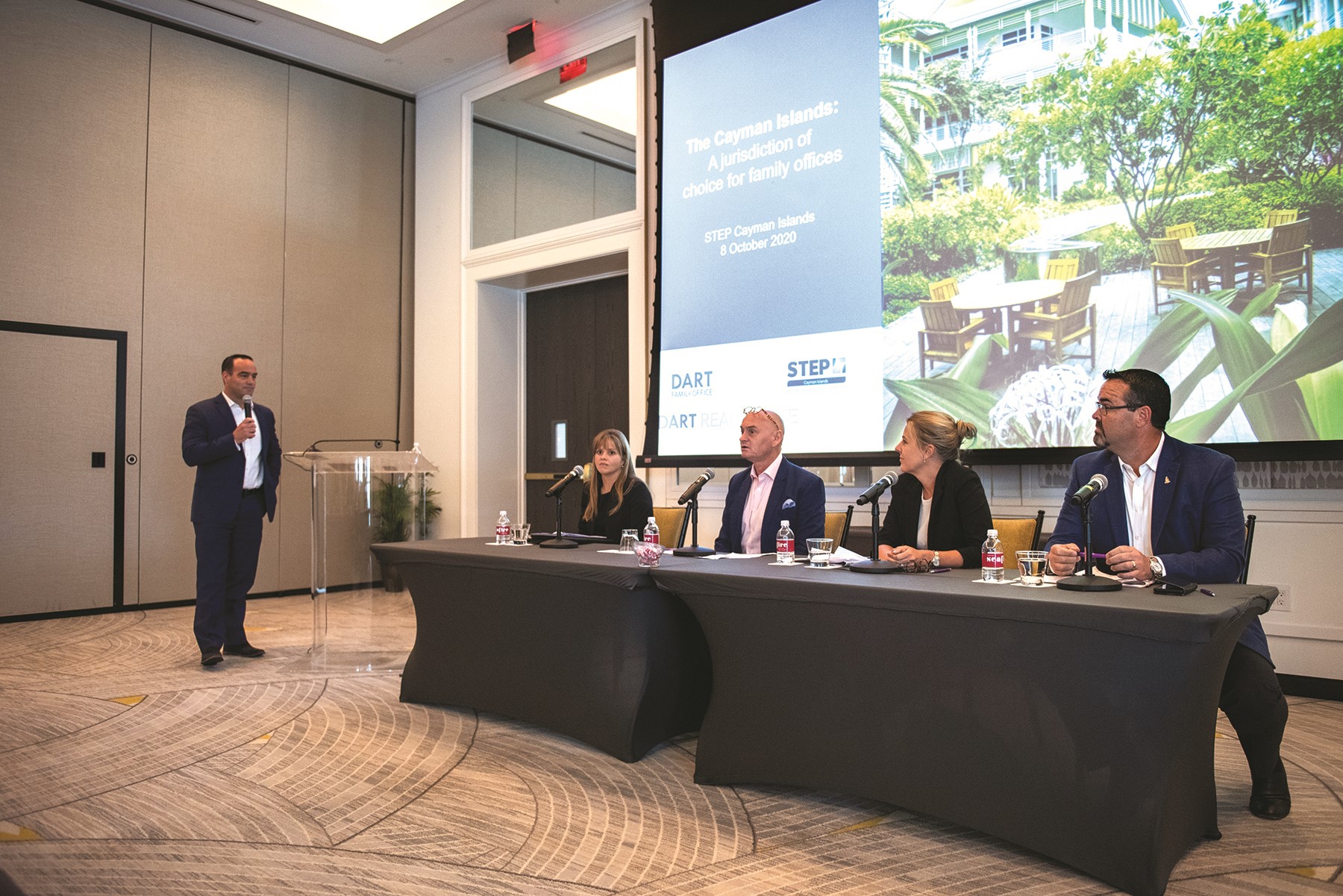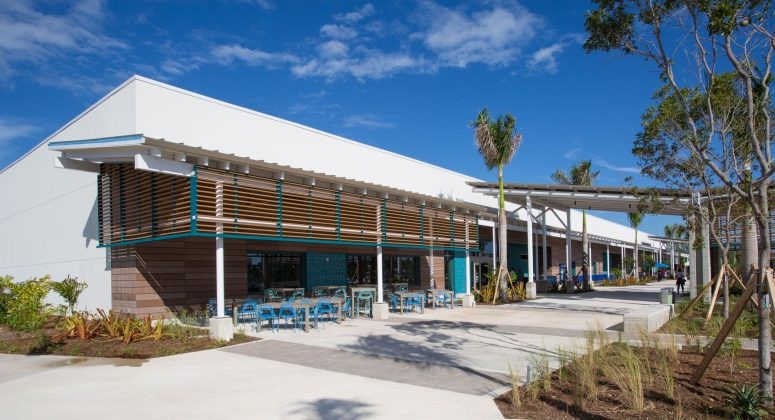Dart VP Business Development Chris Duggan, Left, Facilitated A Panel Discussion With STEP Professionals, From Left, Tamara Corbin, Andrew Miller, Bernadette Carey And Ministry Of International Trade, Investment, Aviation And Maritime Affairs Chief Officer Eric Bush. Photo: Bobby Hulse
By Alan Markoff
One of the first in-person business conferences on Grand Cayman since the onset of the COVID-19 pandemic occurred on 8 October with a Dart-sponsored event for members of the Cayman Islands’ chapter of the Society of Trust and Estate Practitioners. The event served to introduce the findings from a special research report commissioned by Dart on the family office sector in the Cayman Islands.
Family offices are privately held entities that manage wealth and investments for high-net-worth families. The net wealth of most of these families exceeds US$100 million in assets. Jurisdictions like the Cayman Islands try to attract family offices because of the potential economic impact wealthy individuals can make through investments and spending without competing in the local employment and business markets.
The report
The research paper, which was produced with research support from Barton Consulting and Wealth-X, two global leaders in market data and research within the private wealth segment, helps position the Cayman Islands as the jurisdiction of choice for family offices considering relocation or expansion.
It was compiled through in-depth interviews with professional advisors — including lawyers, trustees, residency and citizenship consultants, ultra-high-net-worth lifestyle consultants, multi-family office advisors, tax advisors, asset managers and private bankers — based in key markets around the world.
The report, which was presented to STEP Cayman members by Dart Vice President Real Estate Marketing and Sales Sue Nickason, cited several considerations for those choosing a new family office location or expanding an existing one. In addition to the needs of the family and its advisors, these considerations also included convenience; professional expertise and reputation; ease of immigration; and family sentiment about relocating.
How those considerations are ranked in importance depends on where the individuals are from.
“What is important to someone in Canada won’t be equally important to someone from Brazil when they’re looking to establish a family office or to expand,” Nickason said. “That’s not to say that an attribute that is important to someone from South America isn’t important to someone from the U.S. or Canada; it’s just not as high on the list.”
The Cayman Islands is considered an attractive jurisdiction for family offices for many of the same reasons the jurisdiction is attractive for real estate and other financial investments. For those from the United States and Canada, these reasons often include time zone, geographical location, the fact that English is the official language, tax neutrality, a low crime rate, reliable telecommunications, an attractive real estate market and lifestyle, particularly with regard to the marine environment.
However, for those in Latin America in places like Brazil, Mexico, Argentina and Colombia, Cayman’s stable economy and legal system took high importance, along with some of the other factors.
“Cayman’s being tax neutral is becoming an increasingly important factor for South American families,” Nickason said.
The research showed that Grand Cayman’s quality was a differentiating factor.
“Quality is the element that unites,” said Nickason, adding that the quality of Cayman’s people, the quality of the place and its quality of life, all combine to offer a unique value proposition for family offices.
“The trinity of people, place and life is special and unique to Cayman,” Nickason said.
Panel discussion
Dart VP Business Development Chris Duggan facilitated a panel discussion about the opportunities and impediments to establishing more family offices in the Cayman Islands after the presentation.
Rawlinson & Hunter partner Tamara Corbin said her firm is seeing an increase in family office inquiries from clients based in many other jurisdictions, including the U.S., Canada, Asia and South America.
“In some cases, they had made inquiries before, chosen another jurisdiction and now they’re coming back,” she said, later adding that in some cases, the clients are looking into secondary family office locales to supplement an existing one.
Bedell Cristin Partner Andrew Miller said most of the family office inquires he’s seeing are coming from Latin America and that he’s hearing a lot of positive comments about what Grand Cayman offers to these clients.
Carey Olsen Partner Bernadette Carey said she has been surprised at how quickly it’s become a trend for people in the United States to inquire about a family office in the Cayman Islands. In the past, they would receive only a very occasional family office inquiry from the U.S.
“Now we’re getting an inquiry every week,” she said.
The political, social and pandemic situations in the United States are major reasons for the trend.
“They’re saying, ‘I just want some peace in my life,’” said Carey.
Miller believes the COVID-19 pandemic has caused many high-net-worth individuals to reconsider where they live and work.
“Because of COVID, they discovered they could run their global office from the Hamptons or London,” he said. “But they’re less enthusiastic about living in a big city at the moment and they’re thinking about making what was temporary, permanent.”
Ministry of International Trade, Investment, Aviation and Maritime Affairs Chief Officer Eric Bush said the government understands that immigration is a key issue with those that might want to set up a family office here, but said he believes it is an unrealistic expectation to think that the government would allow just anyone to come. However, he said the government’s goal is to make the immigration and arrival process consistent, transparent and efficient.
This Article First Appeared In The November 2020 Print Edition Of Camana Bay Times.
About the author
Alan Markoff has worked with Dart as the editor for Camana Bay Times for three years and has been writing professionally since 1997. Born and raised in Cleveland, Ohio, Alan graduated from the State University of New York at Albany with a degree in English, and first moved to the Cayman Islands in 1982. He has 16 years of experience in the real estate industry and previously worked as a journalist for Cayman Compass before joining Dart to relaunch the Camana Bay Times monthly newspaper. An avid baseball fan, Alan loves travelling but also schedules trips back home around catching a summer game or two with his home team, Cleveland Indians.




